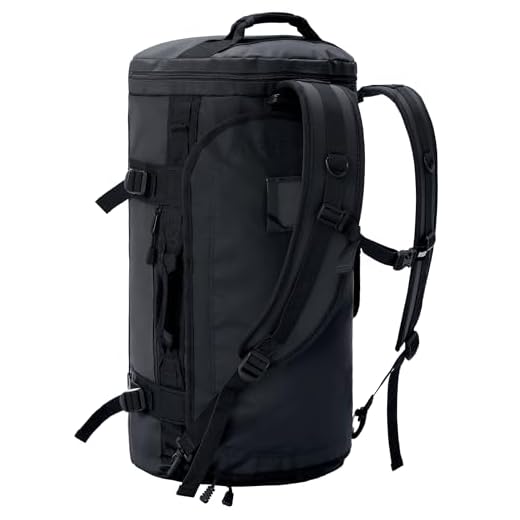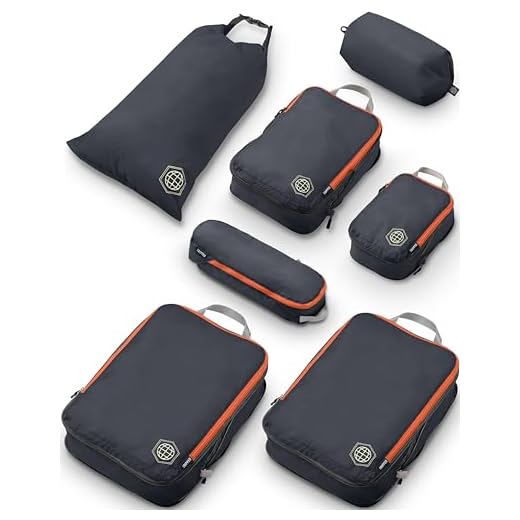






Prioritize durability and weight when selecting containers for your outdoor excursion. Opt for products made from water-resistant materials that can withstand harsh conditions, yet remain light enough for easy transport. Look for options featuring reinforced stitching and strong zippers to ensure longevity.
Consider size carefully. Aim for a container that accommodates your essentials without excess space, which can add unnecessary weight. A good rule of thumb is to choose an option that has a capacity between 40 to 70 liters, allowing for decent storage while still being manageable.
Don’t overlook the importance of organization. Choose designs with multiple compartments to help separate clothing, gear, and food. This arrangement makes items more accessible and contributes to a streamlined experience, especially on multi-day trips.
Lastly, comfort is key. Look for padded shoulder straps and adjustable fittings to ensure a snug fit. This consideration not only enhances portability but also reduces strain during long hikes.
Recommended Gear for Outdoor Adventures
Opt for a sturdy duffel bag with reinforced stitching. This choice provides ample space and easy access to your equipment. Look for designs with padded handles and adjustable straps for comfortable carrying during treks.
Waterproof dry bags are crucial for protecting clothing and electronics from moisture. Choose various sizes to categorize items, ensuring quick identification and retrieval. Each piece should be lightweight yet durable to withstand the elements.
Backpacks, especially those with multiple compartments, are ideal for walking trips. Select a model featuring an adjustable hip belt for weight distribution. Aim for one with a hydration reservoir to keep liquids accessible.
Rolling suitcases can be convenient for more structured environments, but consider terrain when choosing this option. If the ground is uneven, a well-made backpack or duffel is often a better alternative.
Cushioned storage solutions, such as foam-padded cases for fragile items like cameras, should not be overlooked. These can provide extra protection against impacts during transport.
Finally, consider packing cubes to help organize your gear within larger bags. They facilitate easy packing and unpacking while keeping everything neatly compartmentalized.
Choosing the Right Backpack Size for Camping
Select a pack size based on the duration of your outdoor adventure:
- 1-2 days: A pack with a capacity between 30-50 liters is suitable. This allows space for essentials such as a sleeping bag, clothing, food, and hydration.
- 3-5 days: Opt for a larger backpack, around 50-70 liters. This size accommodates extra gear, including cooking equipment and additional food supplies.
- More than 5 days: For extended trips, consider a pack exceeding 70 liters. This will fit all necessary items while ensuring comfort during the hike.
Child and Size-Specific Recommendations
- Children’s backpacks: Limit the size to 20-30 liters. Choose lightweight options to reduce strain.
- Frame type: Internal frames offer better load distribution for larger capacities, while external frames are suitable for lighter loads.
Check weight distribution. Balance is key for comfort. Load heavier items closer to your back and lighter items further out. Test the fit and adjust straps for a snug feel without restricting movement.
Always pack efficiently. Use compression sacks for clothing and utilize all available pockets. Keep frequently used items easily accessible.
Durability Features to Look for in Camp Luggage
Prioritize materials like ripstop nylon or polyester for high resistance to tears and abrasions. Opt for water-resistant or waterproof coatings to safeguard contents during unexpected weather changes. Reinforced stitching at critical stress points enhances overall durability, ensuring longevity through varied conditions.
Handles and Straps
- Choose padded handles for comfort during transport.
- Adjustable and removable straps provide versatility while distributing weight evenly.
- Consider webbing loops for additional attachment options.
Weatherproof Features
- Sealed seams prevent moisture ingress; essential for protecting gear.
- Ventilated compartments help reduce odor build-up from damp equipment.
- Reflective details increase visibility in low-light settings.
Assess zippers for durability; opt for reinforced, water-resistant options to ensure smooth functionality. Regularly check and maintain closures, as they are often the first point of failure. Finally, a sturdy base or frame adds stability, preventing wear from rough terrain and prolonging usefulness over time.
Storage Options: Compartmentalization for Easy Access
Opt for bags with multiple compartments or pockets to streamline organization and access. A well-structured interior allows quick retrieval of essentials, minimising unnecessary rummaging. Look for modular systems where items can be separated effectively, facilitating smarter packing strategies.
Consider options with external pockets for items you need frequently, such as snacks or tools. This prevents disruption to your main storage area and keeps necessities at your fingertips. Additionally, compression compartments can reduce bulk and maintain order, making it easier to find what you need without unpacking.
Utilize clear, zippered pouches for smaller items like toiletries or first aid supplies. Visibility simplifies locating specific items in a blink. Furthermore, integrating a few adult-sized zippered bags can keep clothes and personal items integrated yet organized.
For a more customized experience, select a backpack that allows for reconfiguration, letting you adapt based on the length of your venture. For further insights on choosing the perfect travel gear, check out the best luggage for summer camp.
Weight Considerations for Camping Gear
Select gear that balances durability and portability. Aim for items weighing no more than 20% of your body weight to ensure comfort during hikes. Lightweight materials, such as ripstop nylon or polyester, provide strong yet easy-to-carry alternatives.
Strategic Packing Tips
Utilize compression sacks and packing cubes to maximize space while minimizing weight. Group similar items together for organized access. Remember to distribute weight evenly to prevent strain during movement.
Choosing Accessories Wisely
When selecting accessories, prioritize lightweight options such as aluminum utensils and inflatable sleeping pads. Heavy-duty plastic bins may seem practical but can lead to unnecessary bulk. For additional resources, explore local options like the best aquarium in southern california for engaging outdoor experiences.
Water Resistance: Protecting Your Gear from the Elements
Opt for a bag made from waterproof materials such as nylon or polyester with a water-resistant coating. These fabrics provide a reliable barrier against moisture, ensuring that your essentials remain dry even in heavy rain or damp conditions.
Sealed Seams and Zippers
Inspect the seams and zippers carefully. Sealed seams prevent water from penetrating, while waterproof zippers offer additional protection. Consider models that feature storm flaps over the zippers to further enhance water resistance.
Rain Covers and Storage Solutions
Many bags come with integrated rain covers. These lightweight layers can easily be deployed when rain is imminent. Additionally, utilizing dry bags or compression sacks inside the main compartment adds an extra layer of defense against water damage, keeping important items secure and organized.
For those seeking versatility, check out the best rolling duffel for traveling, designed with water-resistant features for outdoor adventures.
Accessibility: Choosing Gear That Suits Your Camp Activities
Opt for soft-sided duffel bags or versatile backpacks that provide easy access to your belongings during outdoor tasks. These types allow flexibility, whether for hiking, fishing, or setting up a campfire.
Adaptability for Various Activities
Select items with features that match specific activities. For example, choose packs with side pockets for water bottles when hiking, or opt for wheeled options if your adventure includes a car trip before reaching the campsite.
Ergonomics and Comfort
Prioritize ergonomics to ensure comfort during use. Look for padded shoulder straps and breathable back panels for long treks. Adjustable components are recommended for a tailored fit, reducing strain and enhancing mobility.
| Activity | Recommended Gear | Key Features |
|---|---|---|
| Hiking | Backpack | Padded straps, side pockets, hydration reservoir |
| Fishing | Soft-sided cooler | Water-resistant material, carry handles, exterior storage |
| Road Trip | Wheeled duffel | Durable wheels, spacious interior, easy access zippers |
Choose options that align with your planned activities to maximize functionality and enjoyment during outdoor experiences.







